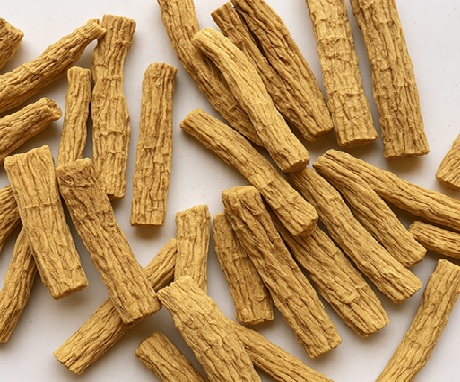Codonopsis Root Chinese Herb

Codonopsis Root (Dang Shen): A Gentle Tonic for Energy, Digestion, and Vitality
Introduction
Codonopsis root, known as Dang Shen (党参) in Traditional Chinese Medicine (TCM), is a prized herb used for centuries as a mild and nourishing energy tonic. Often called the “poor man’s ginseng,” codonopsis offers many of the same benefits as ginseng but with a gentler effect, making it suitable for daily use and for a wider range of people. It’s commonly used to boost qi (vital energy), improve digestion, and support immune health.
What Is Codonopsis Root?
Codonopsis root comes from the Codonopsis pilosula plant, a flowering perennial native to China and parts of East Asia. In TCM, it is classified as a tonic herb that supports both the Spleen and Lung meridians. The dried root is typically sliced and used in teas, decoctions, and cooking. Codonopsis is valued for its sweet taste, versatility, and gentle tonifying action—ideal for those who are weakened, recovering from illness, or seeking daily wellness support.
Health Benefits of Codonopsis Root
1. Boosts Qi and Gently Increases Energy
Codonopsis is used in TCM to strengthen the body’s qi, particularly the qi of the Spleen and Lungs. It’s beneficial for those who experience tiredness, weakness, or low energy without the overstimulating effects of stronger herbs like ginseng.
2. Enhances Digestive Function
By tonifying the Spleen (which governs digestion in TCM), codonopsis can help improve appetite, absorption of nutrients, and ease symptoms like bloating or fatigue after eating.
3. Supports the Immune System
Codonopsis may help boost immune function by stimulating white blood cell activity. It’s often included in formulas to support immunity and improve the body’s ability to fight infections.
4. Promotes Lung Health and Respiration
This root is traditionally used for chronic cough, shortness of breath, and weak respiratory function. It moistens and supports the lungs, making it useful during recovery from colds or respiratory illnesses.
5. A Gentle Adaptogen
While not as strong as astragalus or ginseng, codonopsis still offers adaptogenic effects, helping the body cope with physical and emotional stress over time.
How to Use Codonopsis Root
In Soups
Codonopsis is commonly simmered in herbal soups along with chicken, pork, red dates, goji berries, and sometimes astragalus. Add 5–10 grams of sliced codonopsis root to your soup. Simmer for at least 1–2 hours. Remove the root before serving; it’s not typically eaten directly.
In Tea or Decoctions
It can be brewed into a warming, slightly sweet herbal tea on its own or with other tonics like licorice root or ginger. Use about 5–10 grams per cup of water. Simmer gently for 20–30 minutes.
In Powder or Capsule Form
Codonopsis is also available in powder or capsule form for easy daily use. Always choose reputable brands with quality control and preferably organic sourcing.
Where to Buy Codonopsis Root
You can find codonopsis root in Chinese herbal medicine shops, health food stores, and online retailers like iHerb, Amazon, or specialized TCM sites. Look for whole or sliced dried root (for soups and teas), organic and sustainably harvested sources, and extracts or formulas with proper dosage guidelines.
Are There Any Side Effects?
Codonopsis is considered very safe and gentle for most people. Side effects are rare. However, those with very damp or phlegm-heavy constitutions in TCM should use with caution. Pregnant or breastfeeding women should consult a qualified practitioner before use. Always consult your healthcare provider if you are taking medications or have a chronic illness.
Conclusion
Codonopsis root is a mild yet effective tonic herb that supports energy, digestion, and immune health. With a sweet taste and gentle action, it’s ideal for people of all ages seeking balanced, long-term wellness. Whether brewed into tea or simmered in nourishing soups, Dang Shen is a versatile and time-honored addition to your natural health toolkit.
FAQs
Q: Can I take codonopsis daily?
A: Yes, codonopsis is safe for long-term daily use in moderate amounts and is often included in daily TCM formulas.
Q: What does codonopsis taste like?
A: It has a sweet, earthy, slightly caramel flavor that blends well in soups and teas.
Q: Is codonopsis safe for children?
A: In food-like doses (such as soup), codonopsis is generally safe for children. Always consult a pediatric herbalist or healthcare provider for guidance.

